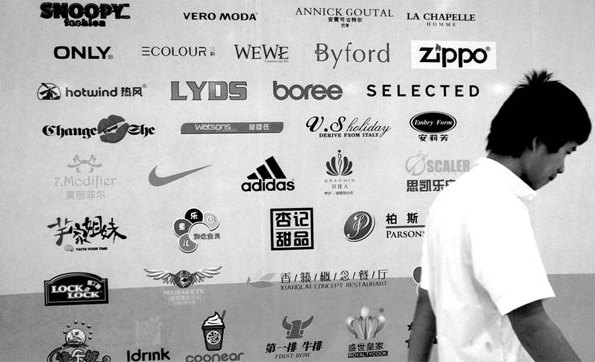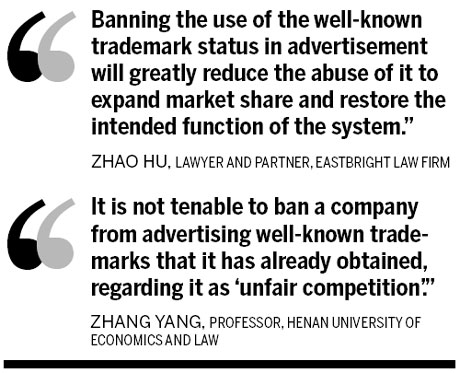|

A citizen of Yichang city in Hubei province walks past the wall of a shopping center displaying trademarks. The second draft version of an amendment to the trademark law forbids using the title of well-known trademarks on product packages and advertisement. Ren Weihong / for China Daily
|
Owners of products recognized as well-known Chinese trademarks can no longer use the legal designation on their product packages or advertisement, according to the second draft version of an amendment to the trademark law submitted to China's top legislative body on June 26.
Some law experts said that the purpose of the well-known trademark system is to protect brands, but it now serves more like a tool to confuse consumers and create unfair competition.
Zhao Hu, an intellectual property rights lawyer and partner of EastBright Law Firm in Beijing, told China Daily that the identification of a well-known trademark is "a legal process to settle disputes based on factual evidence of individual cases", and different cases can lead to different results.
"Identifying a well-known trademark is not the conferral of an honorary title," he said. "It does not directly represent product quality and reputation, although these facts are taken into consideration in the process."
However, there are problems currently in the identification and promotion of the concept, Zhao noted.
"Some local governments regard the number of well-known trademarks as one of their achievements and give awards to companies when they acquire the status," he said.
Zhao also said many exploit the designation for their own benefit.
"Some companies, on the other hand, have created disputes purposely just to apply for the status," he said.
"Many well-known trademarks are actually not well known enough, and the mechanism is becoming a commercial tool for companies to expand their market share. So when they are boasting such so-called well-known trademarks in their advertisement, they are actually cheating the consumers."
In recent years, many domestically renowned companies that have achieved the designation, especially food companies, have been involved in serious quality scandals, including the former dairy giant Sanlu Group, which went bankrupt after it was found selling contaminated infant formula.
"Banning the use of the well-known trademark status in advertisement will greatly reduce the abuse of it to expand market share and restore the intended function of the system," said Zhao.
"And the rights of consumers will also be protected because they will no longer be misled by the title."
Huang Hui, professor of law from Southwest University of Political Science and Law, agrees with Zhao.
"The well-known trademark is a tool of government intervention into market operations," said Huang.
But there are others who oppose the initiative.
Zhang Yang, a professor at the Henan University of Economics and Law, told local newspaper Henan Business Daily that it is "not tenable to ban a company from advertising well-known trademarks that it has already obtained, regarding it as 'unfair competition'".
The newspaper also quoted a local owner of a well-known trademark who said, "If we conceal the fact that we actually have well-known trademarks from the consumers, will it then violate their right to know?"
Feng Xiaoqing from the China University of Political Science and Law said the well-known trademark has a vague definition, which is one of the key reasons that it can confuse the consumers.
He noted that the concept is "not defined clearly" in the trademark law and has different definitions in a number of regulations and judicial interpretations.
Lawyer Zhao Hu added that it is difficult to execute the ban, even if the draft version is approved.
"This ban will influence the interests of many sides, so enforcement could be weak," he explained. "There have to be additional regulations to guarantee efficient enforcement."
Many other industry insiders also have concerns that advertisers will use similar concepts to replace the well-known trademark, such as famous trademarks or famous brands.
The well-known trademark system in China was established in 1985, when the nation joined the Paris Convention on the Protection of Industrial Property. The State Administration for Industry and Commerce as well as the judiciary are both empowered to identify well-known trademarks.
[email protected]

(China Daily 07/03/2013 page17)


